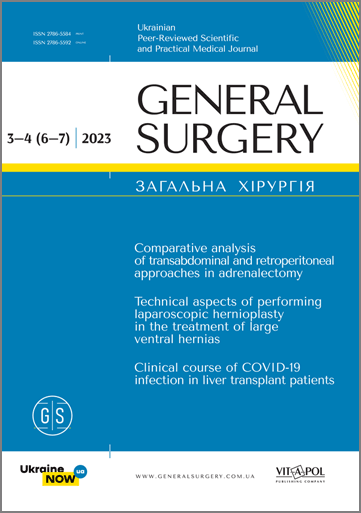Postoperative complications for complicated malignant tumours of the stomach
DOI:
https://doi.org/10.30978/GS-2023-3-57Keywords:
malignant stomach tumours, gastrointestinal bleeding, complications, perforation, stenosisAbstract
Objective — to determine the frequency and structure of postoperative complications for malignant tumours of the stomach accompanied by gastrointestinal bleeding.
Materials and methods. The study analysed the treatment outcomes of 101 patients with a malignant tumour of the stomach complicated by bleeding (84 cases), perforation (6 cases), or stenosis (19 cases, with 8 of them having both stenosis and bleeding). These patients underwent inpatient treatment at the Kyiv City Centre for Gastrointestinal Bleeding and the Kyiv City Clinical Hospital of Emergency Medical Help between 2015 and 2020. Out of the patients, 78 (77.2%) had histologically confirmed cancer, 11 (10.9%) had GIST, and 12 (11.9%) had malignant lymphoma.
Results. During the peak period of ongoing and recurrent bleeding, 5 (6%) patients required emergency surgery, including 2 (40%) radical and 3 (60%) non‑radical procedures. After proper preoperative preparation and a comprehensive follow‑up assessment, 58 (57.4%) patients underwent radical surgical interventions for stomach cancer complicated by acute gastrointestinal bleeding in the early delayed period. In the early postoperative period, 4 (15.4%) patients experienced complications after 26 radical gastrectomies combined with jejunogastroplasty. In the delayed period, early postoperative complications occurred in 9 (28.1%) patients after 32 radical gastric resections. The total postoperative mortality after emergency surgical interventions was 20.0%. The total postoperative mortality in the early‑term period was 5.7% (5 patients out of 88), which is 3.5% less compared to emergency operations (the difference is statistically significant, p ≤0.05).
Conclusions. When urgent surgical interventions are carried out at the peak of ongoing and recurrent bleeding, the mortality rate from postoperative complications is 3.5 times higher than when operations are performed in the early delayed period after adequate preparation and comprehensive patient monitoring. The death rate after radical operations is 2.1 times lower than that after palliative and symptomatic operations. As the operations conducted during the peak bleeding period are associated with high postoperative mortality, we believe that they pose a high risk to patients with malignant tumours of the stomach.
References
Cowling J, Gorman B, Riaz A, Bundred JR, Kamarajah SK, Evans RPT, Singh P, Griffiths EA. Peri-operative Outcomes and Survival Following Palliative Gastrectomy for Gastric Cancer: a Systematic Review and Meta-analysis. J Gastrointest Cancer. 2021 Mar;52(1):41-56. doi: 10.1007/s12029-020-00519-4. Epub 2020 Sep 22. PMID: 32959118; PMCID: PMC7900337.
Guideline Committee of the Korean Gastric Cancer Association (KGCA), Development Working Group & Review Panel. Korean Practice Guideline for Gastric Cancer 2018: an evidence-based, multi-disciplinary approach. J Gastric Cancer. 2019;19(1):1-48. http://doi.org/10.5230/jgc.2019.19.e8. PMID: 30944757.
Hamashima C. Systematic review group and guideline development group for gastric cancer screening guidelines. Update version of the Japanese guidelines for gastric cancer screening. Jpn J Clin Oncol. 2018;48(7):673-83. http://doi.org/10.1093/jjco/hyy077. PMID: 29889263.
Jwo SC, Chien RN, Chao TC, Chen HY, Lin CY. Clinicopathological features, surgical management, and disease outcome of perforated gastric cancer. J Surg Oncol. 2005;91(4):21925. http://doi.org/10.1002/jso.20307. PMID: 16121341.
Kim YI, Choi IJ, Cho SJ, et al. Outcome of endoscopic therapy for cancer bleeding in patients with unresectable gastric cancer. J Gastroenterol Hepatol. 2013;28(9):1489-95. http://doi.org/10.1111/jgh.12262. PMID: 23662891.
Schatz RA, Rockey DC. Gastrointestinal bleeding due to gastrointestinal tract malignancy: natural history, management, and outcomes. Dig Dis Sci. 2017;62(2):491-501. http://doi.org/10.1007/s10620-016-4368-y. PMID 28032204.
Shin J, Cha B, Park JS, et al. Efficacy of a novel hemostatic adhesive powder in patients with upper gastrointestinal tumor bleeding. BMC Gastroenterol. 2021;21(1):40. http://doi.org/10.1186/s12876-021-01611-0.
Yang K, Liu K, Zhang WH, et al. The value of palliative gastrectomy for gastric cancer patients with intraoperatively proven peritoneal seeding. Medicine (Baltimore). 2015;94(27):e1051. http://doi.org/10.1097/MD.0000000000001051. PMID: 26166075.
Downloads
Published
How to Cite
Issue
Section
License
Copyright (c) 2024 Authors

This work is licensed under a Creative Commons Attribution-NoDerivatives 4.0 International License.






